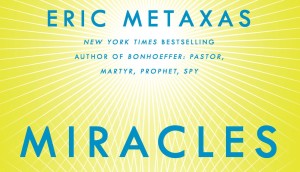 Throughout this year, the staff of Central Baptist Church has been working through Eric Metaxas’ Miracles: What They Are, Why They Happen, and How They Can Change Your Life. Like so many others, I was interested to see what Metaxas would do to follow up his enormously successful and insightful Bonhoeffer: Pastor, Martyr, Prophet, Spy. The result, Miracles, proved to be, in my estimation, and, if I may say so, in the estimation of the CBC staff, an interesting if uneven book. In truth, I would almost call this book a curiosity, and one that I do not quite know how to summarize.
Throughout this year, the staff of Central Baptist Church has been working through Eric Metaxas’ Miracles: What They Are, Why They Happen, and How They Can Change Your Life. Like so many others, I was interested to see what Metaxas would do to follow up his enormously successful and insightful Bonhoeffer: Pastor, Martyr, Prophet, Spy. The result, Miracles, proved to be, in my estimation, and, if I may say so, in the estimation of the CBC staff, an interesting if uneven book. In truth, I would almost call this book a curiosity, and one that I do not quite know how to summarize.
The book consists of two parts. Part one, “The Question of Miracles,” was, in my opinion, the best section of the book. Here, Metaxas turns his undeniably perceptive mind and effective writing skills toward an apologetic for miracles. These first one-hundred-and-eleven pages provide a very accessible, very balanced, and very helpful summary of what miracles are and why we are justified in believing that miracles occur. The section ends with the most powerful and significant miracle of all: the resurrection of Jesus. To be honest, this first section would make a nice stand-alone booklet on the topic that I think would be very useful to the Church today.
The second part of the book is entitled “The Miracles Stories.” Here, Metaxas simply passes on miracles stories as they were told to him by people he knows personally. This is an engaging approach, to be sure, as one would expect miracle stories to be. Even so, this section was simply odd at points. Sometimes the miracle stories seem to end abruptly at points that catch the reader off guard. Sometimes the miracle stories raise more questions than they answer. Some aspect are troubling, such as the occasional presence of preachers and ministries in the stories that are rightly considered borderline heterodox by most in the Church today. Sometimes one cannot help but ask if the story recounted was even really a miracle.
It is a mixed bag. Many of these stories are profoundly inspirational. Some are odd. Some are confusing. Some fall flat. All of this is, of course, highly subjective. You may read these stories and disagree completely. But I guess that is the beauty of personal narratives: they hit all of us in different ways.
To be sure, the idiosyncratic, eclectic, and uneven nature of the second part of the book in no way detracts from the strength of the whole or dilutes the central contention of the book. I would say instead that it rather bolsters it. Even so, I personally could not help but feel that perhaps the book could have been a good thirty pages shorter with a few of the more questionable stories left out.
Regardless, that is Metaxas’ call, thank goodness, and not mine. The book seems to be a real encouragement to folks, and I’m certainly glad I read it. It was an intriguing and occasionally odd exercise, but one that is worth checking out.
